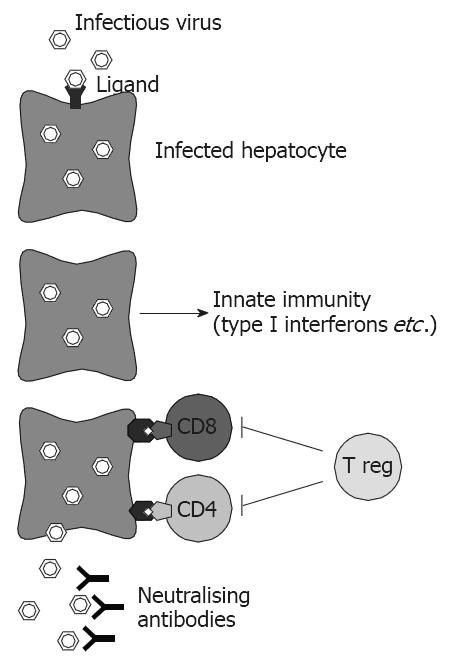Published online Sep 28, 2007. doi: 10.3748/wjg.v13.i36.4807
Revised: July 9, 2007
Accepted: July 16, 2007
Published online: September 28, 2007
- Citation: Thimme R. Immunity to hepatitis C virus infection: Update 2007. World J Gastroenterol 2007; 13(36): 4807-4807
- URL: https://www.wjgnet.com/1007-9327/full/v13/i36/4807.htm
- DOI: https://dx.doi.org/10.3748/wjg.v13.i36.4807
This 8-part topic review series, "Hepatitis C virus: virology, immunology and pathogenesis", was designed to provide expert opinion and new insights for the Journal's readership.
Hepatitis C virus (HCV) is a small single-stranded RNA virus that belongs to the Flaviviridae virus family. More than 120 million people are chronically HCV infected. The factors that determine the outcome and natural course of HCV infection are not completely understood. However, it is generally accepted that next to virological factors innate and adaptive immune responses play an important role in both, control of HCV infection and as disease pathogenesis (Figure 1).
In recent years, significant progress has been made in understanding basic mechanisms of viral replication, innate and adaptive immune responses, such as CD+ and CD8+ T cells as well as neutralizing antibodies, and the possible role of regulatory T cells in orchestrating the adaptive immune response. However, the central question why HCV is able to evade the innate and adaptive immune response and to establish viral persistence in the majority of acutely infected patients is still unknown. In this review series, recent advances in HCV virology and immunology will be highlighted. Clearly, a better understanding of the dynamic host-virus interactions during HCV infection is crucial for the development of new prophylactic and therapeutic vaccines.
4808 Sequence diversity of HCV: Implications for immune control and therapy
Timm J, Roggendorf M
4818 Interaction of hepatitis C virus with the type I interferon system
Weber F
4824 Neutralizing antibodies in hepatitis c virus infection
Zeisel MB, Fafi-Kremer S, Fofana I, Barth H, Stoll-Keller F, Doffoël M, Baumert TF
4831 CD4+ T cell responses in hepatitis C virus infection
Semmo N, Klenerman P
4839 Host and viral factors contributing to CD8+ T cell failure in hepatitis C virus infection
Neumann-Haefelin C, Spangenberg HC, Blum HE, Thimme R
4848 Memory CD8+ T cell differentiation in viral infection: A cell for all seasons
Radziewicz H, Uebelhoer L, Bengsch B, Grakoui A
4858 Regulatory T cells in viral hepatitis
Billerbeck E, Bö ttler T, Thimme R
4865 Hepatitis C virus infection and apoptosis
Fischer R, Baumert T, Blum HE









